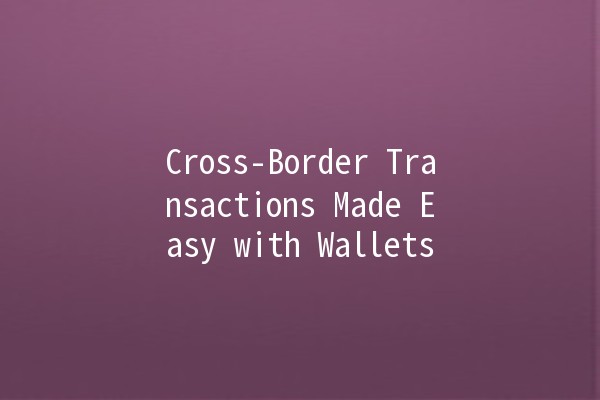




In today’s fastpaced digital world, the ability to conduct crossborder transactions seamlessly has become crucial for businesses and individuals alike. Wallets, particularly digital wallets, have revolutionized how we transfer funds across borders. This article delves into the intricacies of utilizing wallets for international transactions, offering practical tips to enhance the process and maximize efficiency.
Before diving into the techniques for improving productivity during crossborder transactions, it’s vital to understand what digital wallets are and why they have gained such popularity.
A digital wallet, also known as an ewallet, is a softwarebased application that securely stores users' payment information and passwords for numerous payment methods and websites. These wallets can facilitate both online payments and physical transactions, serving as a goto solution for managing financial activities.
As globalization expands, businesses are finding themselves engaging in transactions with clients and suppliers worldwide. Traditional banking methods often involve lengthy processes, high fees, and currency conversion challenges. Digital wallets simplify these transactions by enabling instant transfers, competitive exchange rates, and often lower transaction fees.
An efficient crossborder transaction can save businesses time and money. Here are five productivityenhancing techniques to optimize the use of wallets for international transactions:

Selecting the right digital wallet is crucial for seamless crossborder transactions. Different wallets have varying features, fees, and supported currencies.
PayPal: Great for quick transactions and supports multiple currencies.
TransferWise (now Wise): Ideal for transferring money at real exchange rates, making it advantageous for businesses dealing with overseas suppliers.
Tip: Research and compare various wallets based on your specific requirements, considering factors like transaction size, frequency, and the countries involved.
Many digital wallets offer builtin currency conversion options. Understanding how to use these features can significantly impact transaction costs.
When using a wallet like Revolut, you can hold multiple currencies in your account and convert them at interbank rates. This capability can save you a considerable amount on conversion fees compared to traditional banking methods.
Tip: Monitor exchange rates regularly and convert your funds when favorable rates are available to maximize your purchasing power.
For businesses that require regular payments to international contractors or suppliers, automating these transactions can boost efficiency and reduce the likelihood of errors.
Using wallets like Xoom or Stripe allows you to set up scheduled transfers, ensuring timely payments without manual intervention.
Tip: Establish reminders and track payment schedules to ensure that all transactions are processed without delays.
Many digital wallets support QR code payments, providing a convenient option for businesses and individuals engaging in transactions where physical presence is advantageous.
In markets like Southeast Asia, wallets such as Alipay and WeChat Pay enable users to scan QR codes for instant payments, minimizing the complexity of currency conversion.
Tip: Integrate QR codes into invoices or billing processes to streamline payment collections, especially during inperson transactions or marketplaces.
Understanding the various fees associated with crossborder transactions can save your business significant amounts over time. Different wallets and transaction methods come with varied fee structures.
If you're using Venmo or Cash App for personal transactions, recognize that these services may charge fees for instant transfers. Alternately, consider using traditional wire transfers for larger sums or an ewallet with lower fees.
Tip: Periodically review transaction costs and explore alternatives whenever feasible. A small percentage difference in fees can lead to large savings over numerous transactions.
Digital wallets offer speed, convenience, and often lower transaction fees compared to traditional banking methods. With instant transfers, users can bypass lengthy bank processes, which is especially beneficial for international partners who need quick settlement.
While digital wallets are generally safe, users should ensure they employ strong passwords and enable twofactor authentication. Additionally, using wallets with robust encryption and fraud detection measures provides extra protection.
Currency fluctuations can impact the real cost of transactions. By using wallets that offer realtime exchange rates, individuals and businesses can mitigate some of these impacts, as they can convert funds at favorable rates before making transactions.
Yes, many digital wallets allow businesses to accept payments from international customers. This service can make it easier for online stores to reach global markets and facilitate instant, secure payments.
Most wallets impose transaction limits based on user verification levels. These limits can vary significantly among platforms, so it's beneficial to review the terms of service for the specific wallet you choose, especially for larger transactions.
Many wallets offer integrated transaction tracking features. Users can often categorize transactions, set budgets, and analyze spending patterns, which aids in managing finances effectively across borders.
By implementing these strategies and utilizing the appropriate digital wallets, individuals and businesses can enhance their crossborder transaction capabilities, lowering costs and improving efficiency. The future of financial transactions lies in the hands of innovative digital solutions, driving a more interconnected global economy.